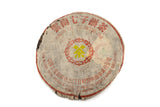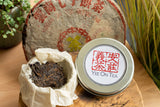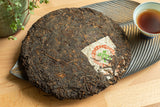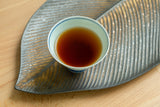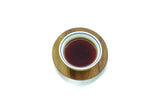yeeonteaco
1973 "Little Yellow Mark" CNNP 7542 Raw Pu-erh Tea Cake
Considered by famous tea critics as one of the best "Chi Tse Beeng Cha" made by the Menghai Tea Factory. The "Little Yellow Mark" (小黃印) is one of the first "7542" when the series was first conceived. It is a tea cake of historical significance and a frequently sought after item by tea collectors and enthusiasts.
We are offering an 8g. tasting samples of this highly praised teacake and this is your rare and unique chance to purchase this aged Pu-erh tea in small quantities and taste this tea without purchasing the whole cake. A great way to try this legendary tea.
The tea liquor is clear bright orange-red with aged plum and fruity fragrance. Early infusions have a layering of smooth, rich, brisk wood, sweet, herbal medicine and aged tea taste with proper "Hui Gan". Later infusion has plum, fruity, dates, sweet taste and "Shengjin" (thirst quenching). Infused tea leaves are dark brown with branches.
A Brief History
Since the beginning of the cultural revolution, Menghai Tea Factory played a leading role in Pu-erh tea production. And the 7542 series of Chi Tse Beeng Cha is by far the longest-running series of tea cake in the company's history in terms of quantity. The experience they gained from the production of this series is representational and set the quality standard for the company’s other products.
Chi Tse Beeng Cha from Menghai province basically collected its Mao Cha from famous tea producing regions and tea plantations of Nanxun, Bada, and Bulang. The traditional 7542 series teacakes are covered with finer younger spring buds on the surface and mainly fourth-grade tea inside. Although some other grades of tea may also use to achieve an optimum taste. In order to maintain consistency of taste year by year, the factory would use Mao Cha from previous years. They also developed a system of collecting different grades and taste of Mao Cha from various cooperative suppliers to maintain the consistency of taste of their products. The description tickets included in every tea cake also mentioned: “Through a process of optimum fermentation and high-temperature steaming and pressing.” This very brief description suggests the full process of creating a tea cake. “Optimum fermentation“ refers to sun withering, fixation, rolling and drying into Mao Cha. Then, depending on whether the end product is raw or ripened tea cake, the latter requires an extra step of Wodiu fermentation.
Then through “high temperature steaming” in a steam furnace to soften the Mao Cha and press into the desired shape of a cake, toucha or tea brick. In some
cases, the term “high-quality material” has been mentioned in some superior tea cake products
The 1968 version of this series being the conceptual and beginning of the 7542 series that set the standard of future products to come. The materials and process of creating the teacake are similar to that of the previous masterpiece era (1950-1972). It uses broader leaves from wild-grown arbor trees instead of tea plantation materials in comparison to later versions. It even has a reputation of being the “red label of tomorrow”. In the 1960s when the tea factory had very limited resources, this version of 7542 uses the same inner ticket as the red and blue label and further shows that they made the best use of resources and use locally grown materials in those days. And the 1973 Little Yellow Mark (Yellow Label) became the more conceivable concept of the 7542 series as the Menghai Tea Factory began to set policies for their future product lines like the 7532, 7452, 7572, 8582 and 8592 etc. The Little Yellow Label is also one of the first teacakes to put Menghai Tea Factory in its inner label. It also set the standard of the defining Pu-erh taste so other related product lines could follow by adjusting the taste according to the 7542 series. This classic, defining Pu-erh taste is rich, delicate, smooth and aged taste. These 2 older versions of 7542 are made during the transitional period of the factory in the ’60s and 70’s when the state-owned factory renamed as “China National Native Produce & Animal by-
products Import & Export Corporation, Yunnan Tea Branch”. mainly to promote Puerh tea as a healthy drink worldwide.

General Guide to brewing Pu-erh Tea
Steep Pu-erh tea in hot boiling water. The ratio of tea leaves to water is approximately 1:4 to 1:5. or 8 grams of tea to 125 ml. of water.
First steep for 5 to 10 sec and discard the water to clean and heat the tea leaves. Steep for 20 seconds, and lengthen the time for each subsequent infusion.
The number of infusion can range from 10 to 20 times.

